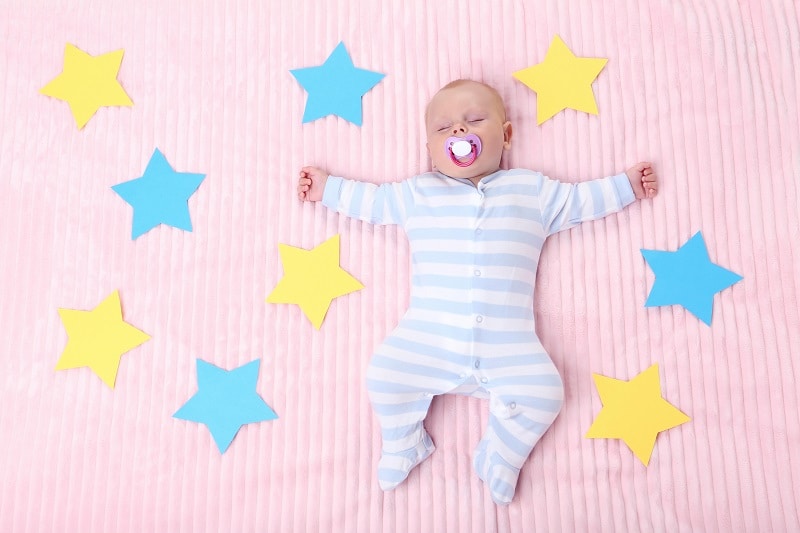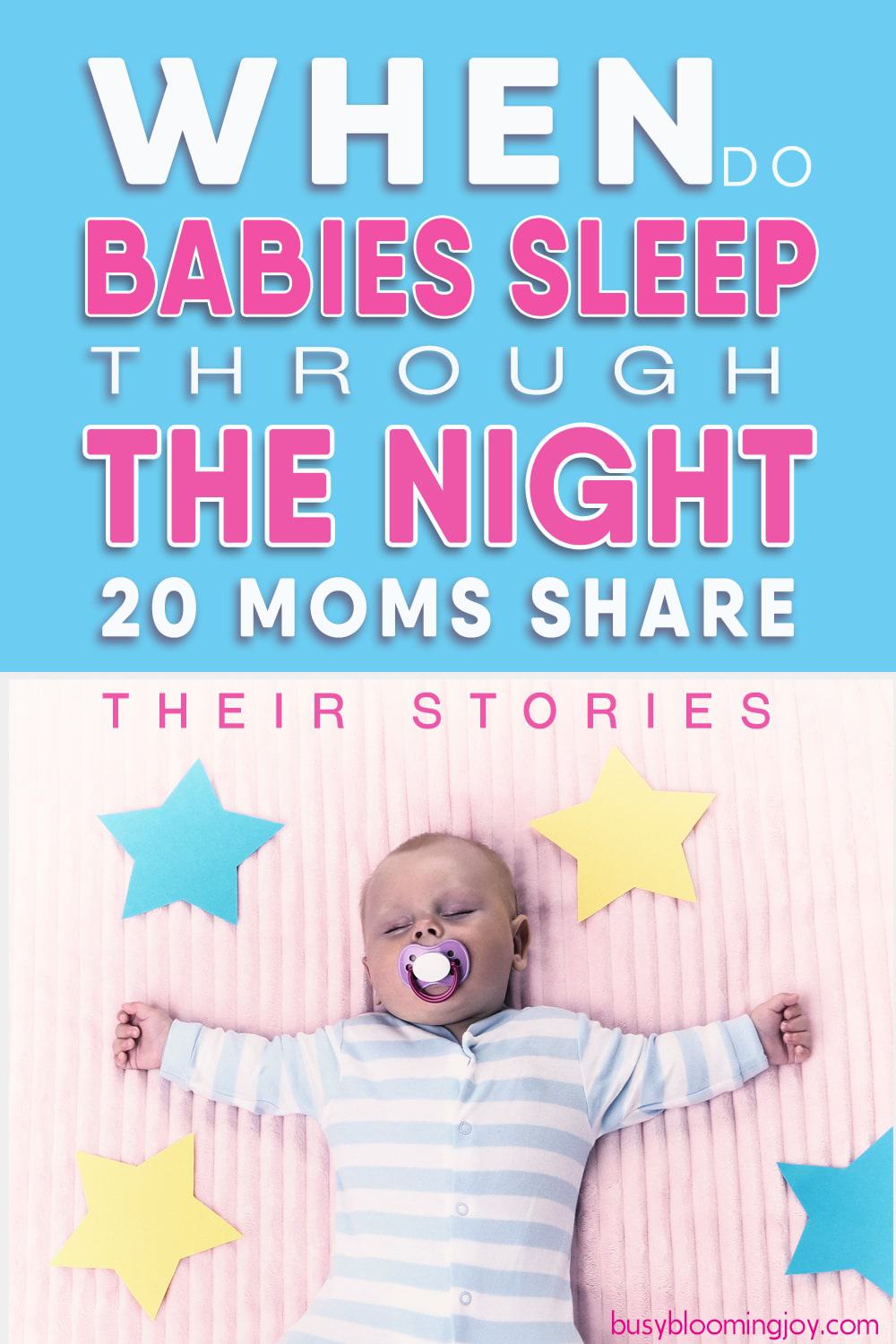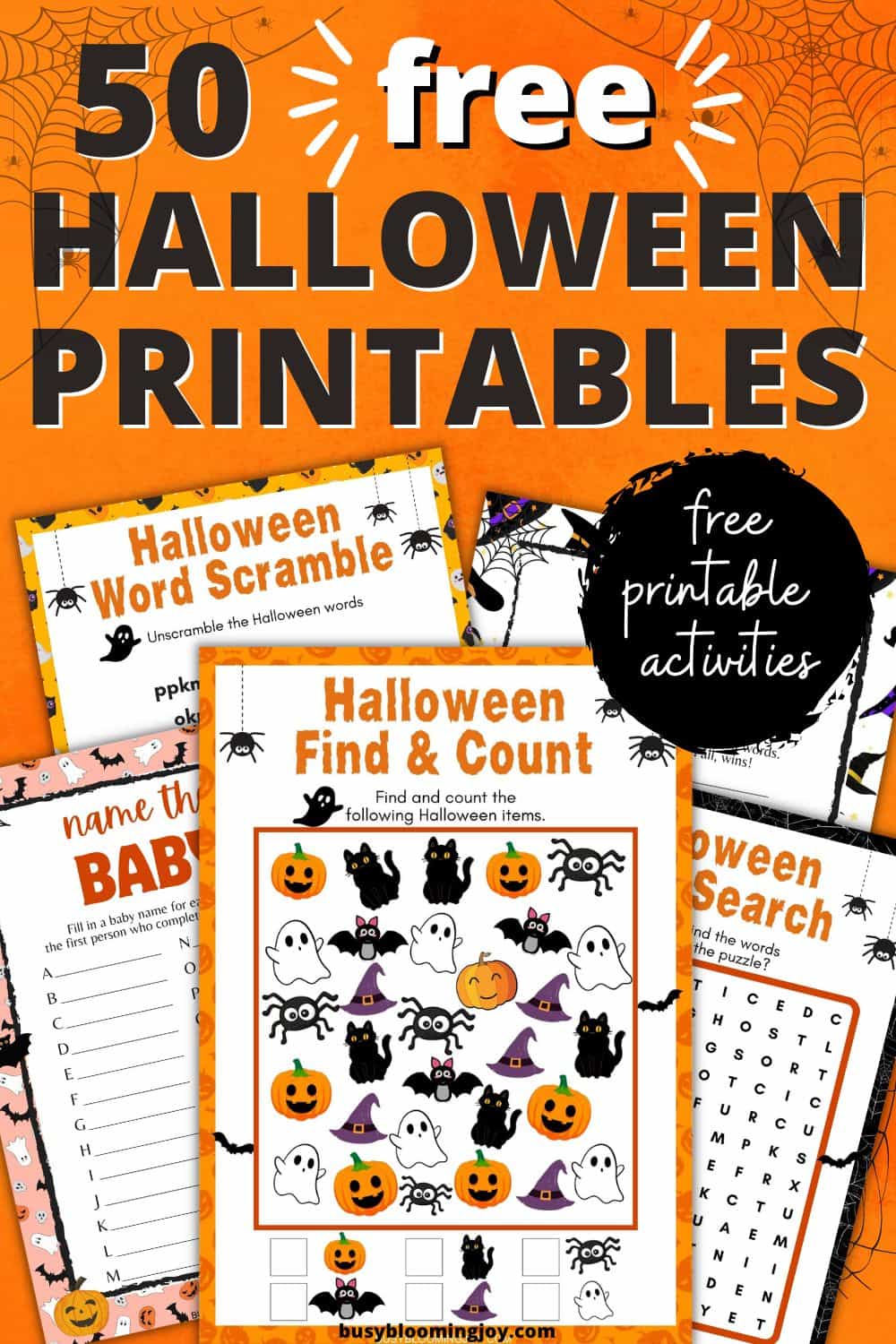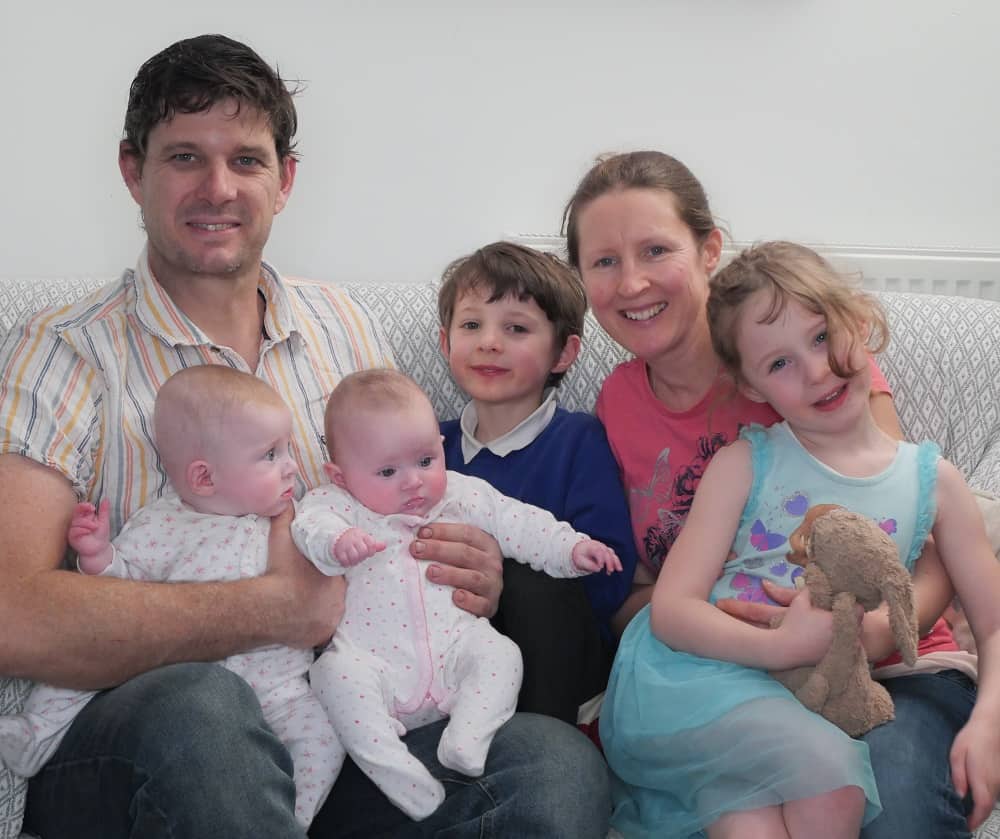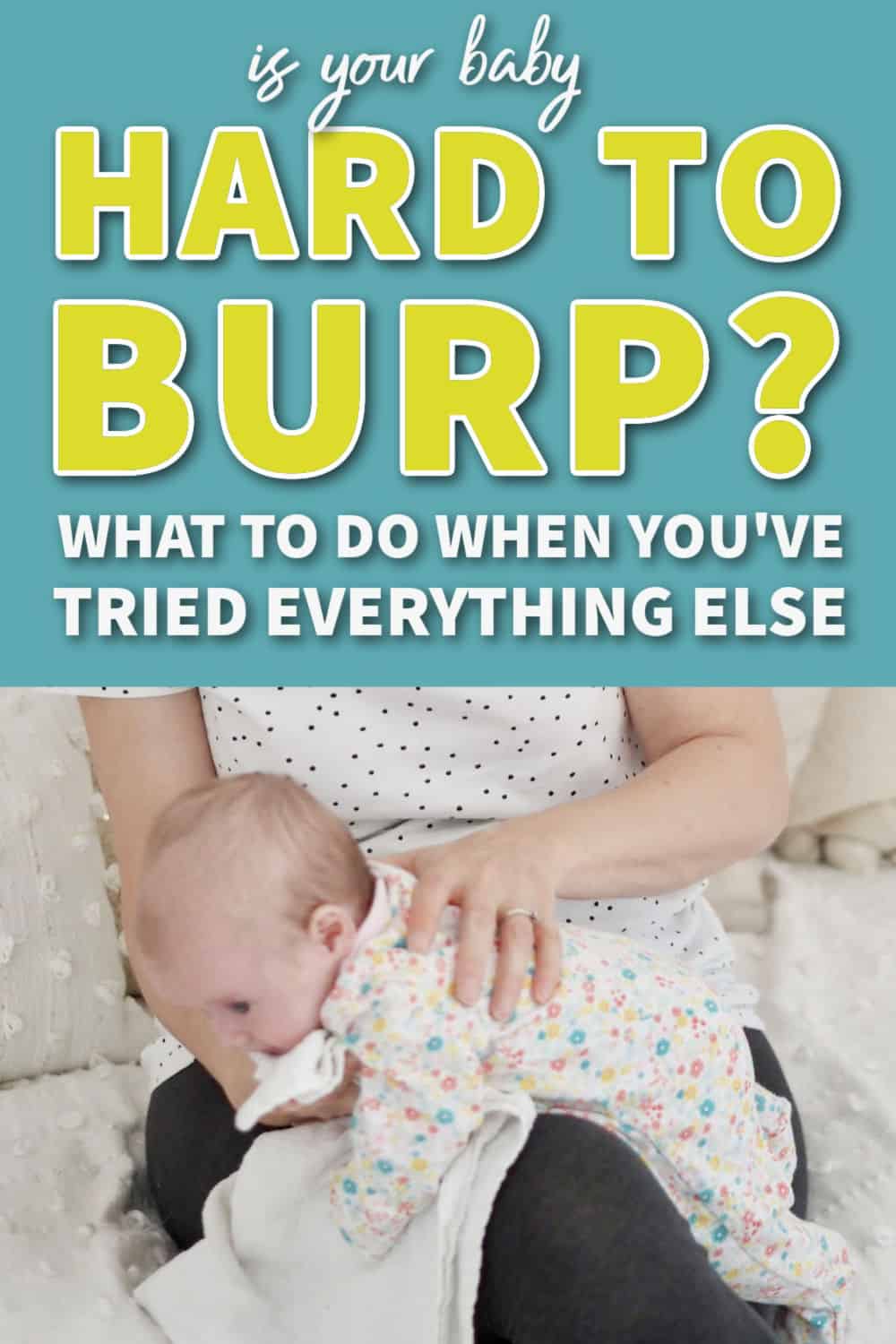Got a teeny, tiny newborn or about to have one? Then you’re quite possibly suffering from a little sleep deprivation or about to!
So you’re probably wondering when your baby is going to sleep through the night.
Maybe you’re secretly hoping you have a ‘good baby’ that sleeps through early? Maybe it’s not even a secret!
When babies sleep through the night is probably one of THE most asked questions by new moms. It certainly was for me. And when you open any baby book, look online or speak to your friends you will find very different answers.
Here you will find answers.
Beyond that, you’re probably hoping for tips and advice on HOW to get your baby sleeping through the night, ASAP. And turn your darling little sleep thief into a sleep pro. (HINT: there may not be a ‘one size fits all’ approach, but there are some magical tricks and tips coming your way in part 2 of this article…)
Here I wanted to open up the floor up to some real moms and explore their baby sleep experience.
I asked 20 other moms when their babies started to sleep through the night and what tactics, if any, they thought helped or hindered.
Now, by no means is 20 even close enough to be determined any kind of legitimate science experiment, but because statistical analysis was my day job I feel it prudent to mention.
So following these discussions, I’ve taken a qualitative approach to my analysis, gathered together some common themes to report back to you.
This has become a a two-part story
This baby sleep ‘story’ became a lot more involved than I first envisioned. I’m not sure why I was so naïve.
Sleeping through the night is a contentious issue, with many wildly different opinions flying around and the process itself is far from simple. We’re talking about your baby transitioning from tiny helpless newborn who has been connected to you for 9 months to slightly less helpless newborn sleeping alone for 8 hours. It’s not a small ask.
So, I’ve divided the story into ‘when’ babies slept through the night in part 1 (that’s the part you’re reading right now) and identified some common themes that seem to explain, in part, why babies slept through when they did.
In the second part we will get to the nitty-gritty of exactly what moms did to encourage sleeping through, their top baby sleep tips.
If you want to skip ahead you can check part 2 out here: Wondering how to get baby to sleep through the night? 20 real-life moms share their best baby sleep tips
Table of Contents
ToggleWhat is considered ‘sleeping through the night’?
Firstly, by asking ‘when do babies sleep through the night’ let’s check we’re all on the same page. For the purposes of this article we’re talking about an 8-hour stretch of sleep and at roughly the same time that you sleep.
During those 8 hours, baby does not require feeding, comforting or any interaction of any sort. So you can get a decent 8 hours of uninterrupted sleep.
So in my mini-survey, the first question I was:
“When did your baby start sleeping through the night (an 8-hour stretch) without needing you in any way?”
‘Sleeping through the night’ does NOT mean, not waking up during the night… hold on while I explain…
The question of ‘When babies sleep through the night’ is a two-part question
The very nature of newborn sleep patterns means some big learnings when it comes to getting baby to sleep through the night. More detail on this in the second part of this baby sleep story.
In short, multiple brief awakenings and easily disturbed light sleep stages are the nature of newborn sleep. The key, then is a babys’ ability to settle back to sleep without your help or ‘self-soothe’.
As a result, sleeping through the night is comprised of 2 elements:
#1 When babies sleep through the night without feeding
#2 When babies can settle themselves back to sleep after waking briefly
When do babies sleep through the night? What the experts say
Like many things parenting, baby sleep and the when and how of your baby sleeping through the night is varied and sometimes controversial. There are big variations in the timings to expect and the tactics used to achieve this.
Opinions on either side of the spectrum
On the one hand, there are the likes of Gina Ford (an ex maternity nurse of 300+ babies), who claims that between the ages of 4 and 6 months babies can start to sleep 12 hours a night (without needing feeding or any other intervention from anyone else).
On the other hand, there are other parenting experts, such as Sarah Ockwell-Smith founder of www.gentleparenting.co.uk, who are of the opinion that babies will continue to wake-up, often multiple times, throughout the first year of life, if not longer.
When it comes to other resources, here are a few found online:
“Some babies sleep through the night within weeks, while others take a year or more to achieve this.” Source
“Most babies do not begin sleeping through the night (six to eight hours) without waking until about 3 months of age, or until they weigh 12 to 13 pounds. About two-thirds of babies are able to sleep through the night on a regular basis by the age of 6 months.” Source
While all babies are different, most babies at this age are capable of sleeping through the night (for about eight to 12 hours)
Baby Sleep Consultant interviewed by The Bump
“There’s a huge range for when babies sleep through the night,” says Kira Ryan, cofounder of Dream Team Baby, a baby sleep consultancy, and coauthor of the book The Dream Sleeper: A Three-Part Plan for Getting Your Baby to Love Sleep. “It could be anywhere from 4 weeks to 4 months, but usually around 4 months, sleep starts to consolidate.” Source
NICU Nurse Carol-Ann who blogs at Ask The NICU Nurse:
“The earliest you can expect your baby to sleep ~8 hour stretches at night is 3 months, usually with a couple interruptions (that don’t require feeding)”
So the take away from this, looking at these two questions is:
#1 When can babies sleep through the night without feeding
Probably by 3 months
#2 When babies can settle themselves back to sleep after waking briefly
Um…. how long is a piece of string, springs to mind…
So let’s see what our 20 moms had to say!
When do babies sleep through the night? What these real-life moms said
Just to reiterate, this is a qualitative approach to the assessment of discussions (which included 6 standard questions) with a few (20) moms. I’m not going to make any wild statements based on this, merely point out some recurring themes and observations supported with other sources/evidence as appropriate.
I’m also not in any way qualified medically, just an analytically-minded mother with a science and statistical analysis background who has become rather sleep obsessed!
OBSERVATION #1 It’s common for babies to sleep an 8-hour stretch by 3 months, whether breastfed or formula fed
Many babies were sleeping an 8-hour stretch by 3 months
In fact, nearly half of mothers had babies that did exactly that, sleeping an 8-hour stretch without needing milk or any interaction of any kind.
My babies first slept through at 3 weeks and 8 weeks. That doesn’t mean we didn’t occasionally have nights where they didn’t sleep, but at that point, they were MOSTLY sleeping through every night. Audrey from Mommy Enlightened
(8 of the 20 mothers, said their babies slept through at 3 months or earlier, a total of 17 babies out of 41.)
Breastfeeding or bottle feeding did not appear to influence when baby slept through
Despite the evidence that breastfed babies do tend to wake more frequently (since breastmilk is more easily digested) when it comes to sleeping an 8-hour stretch, it’s entirely possible for a breastfed baby to manage this by 3 months.
13 of the 17 babies that slept through by 3 months were breastfed.
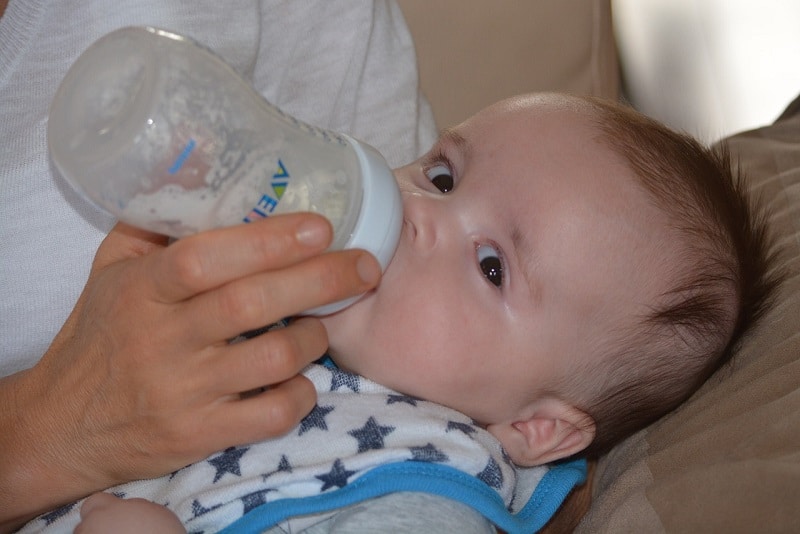
OBSERVATION #2 It’s common for kids to only start sleeping through as toddlers
Around a third of mothers reported that their babies had still not slept through the night by a year old. Some were still waking when well over a year old, up to the age of 2.5. (6 of the 20 mothers, 10 babies out of 41)
“My oldest started sleeping through at around 2.5 for my oldest, my middle child around 1.5-2 and my youngest at 2. They pretty much went to about 11-12 hours per night as their “sleep through the night” since they were older. ” Samantha from Evidence-Based Mommy
OBSERVATION #3: Mothers can influence when their babies slept through
Mothers of babies sleeping through by 3 months had a string of tactics they started early on
There were a lot of similarities in tactics between mothers, which we will get onto in part 2: Wondering how to get baby to sleep through the night? 20 real-life moms spill the beans with their best baby sleep tips
The point is, that certain tactics often work.
As Renee from Rhythms & Grace put it:
“We were lost and confused when our first child was born. She wouldn’t sleep unless held and wanted to nurse ALL the time. Between that and postpartum hormones, I was an exhausted mess!
Our pediatrician and a dear friend both gave us invaluable sleep training advice and I read a couple books… who knew you could do specific things to make a teeny tiny newborn sleep better and be happier when awake!? (I didn’t!!)
For our next 3 children there were several things we did within the first week they were born. As a result, by 6-10 weeks all 4 of our babies were sleeping an 8-hour stretch”
These mothers said sleeping through was a gradual process
Nearly all moms said that night feedings were gradually stretched out until they disappeared altogether. A natural progression that they attributed to the set of tactics they were using.
“Sleeping through the night was definitely a gradual thing for us! It was small incremental changes…which I put down to the gentle sleep training approach I used.” Ashley from Mom Like You Mean It
Mothers with more than 1 child had similar sleep experiences with all their children
In nearly all circumstances, those with multiple babies had similar sleep stories. For example, the (brave, but arguably crazy!) moms with 4 kids answered like this:
Renee from Rhythms & Grace:
“All 4 of our kids were sleeping 8 hours through the night by 6-10 weeks old and 11-12 hours through the night by 12-16 weeks old. “
Christa from The House That Never Slumbers:
“None of my four were sleeping through the night at 1 year, probably not even at 2 years.”
This supports the fact that as a mother, you can influence when your baby sleeps through.
Babies still waking at 3+ months were often night weaned with or without ‘soft’ cry-it-out to get them to sleep through
Babies still waking were nearly always feeding in order to fall back to sleep. A feeding to sleep ‘association’ had developed.
Sleep associations are very common and only develop at the 3-4 month mark. (Sleep associations and self-settling are discussed in part 2 of this baby story in a lot more detail.)
Hence, why moms often chose to ‘intervene’ in some way in order to get their baby to sleep through the night. So, sleeping through normally followed a process of night-weaning.
Christina from Raising Biracial Babies described her experience:
“With my first I gave her a pacifier instead of nursing and it took a few weeks of doing that to stop nursing at night. Which also meant sleeping without needing anything from me. With my second I gave him a bottle to replace nursing sessions and gradually reduced those over a couple of weeks. At that time he could sleep without needing anything from me.”
OBSERVATION 4: One mother chose to do nothing to get her babies to sleep through the night
This was the brave mom of 4, and insomniac herself, Christa from The House That Never Slumbers. (Fear not, her babies did sleep through the night eventually but it tended to be around the 2-year mark, with the exception of her daughter who is also an insomniac and never has.)
Christa explains why she chose to do nothing:
“I did not try to get my babies to sleep through the night. During my first pregnancy, I was in college and taking educational psychology where I learned a lot about how the brain develops and matures.
Babies were designed to wake frequently. It’s a built-in protection mechanism for them to keep all their immature body systems alert. Trying to get a baby to sleep soundly through the night is overriding their natural survival instincts.”
Newborn babies do have many brief awakenings throughout the night, it’s the very nature of newborn sleep and a crucial survival mechanism as Christa points out. It’s undisputable scientific fact.
However, it’s also a fact that babies can learn to settle back to sleep on their own without your help (this is called ‘self-soothing’). And it doesn’t need to involve tears.
My babies learned to and so did those of several other moms. You guessed it; we will get to this in part 2.

OBSERVATION 5: Some mothers whose babies slept through early thought perhaps they’d ‘got lucky’
This included Mallory from Mama On Parade, who said:
“My baby was a pretty great sleeper (though not a great napper) from the beginning. I got really lucky”.
As we established earlier, sleeping through is about (1) fulfilling hunger needs and (2) the ability to go back to sleep on waking in the night, or ‘self-soothe’ (since all babies wake in the night)
The second part of this baby sleep story goes into sleep associations and self-soothing in some detail and cites some interesting research into this topic. (And this post goes further still: Want baby to sleep through the night? Essential learnings from newborn sleep and the ONLY tip you really need)
But it’s interesting to note now that so far, there is no evidence to suggest that the temperament of a baby is related to his or her ability to self-soothe. This study specifically tested several temperament ‘dimensions’ alongside other variables thought to influence self-soothing. But no relationship with temperament was found.
Of course, that doesn’t mean temperament isn’t related to self-soothing, just that there’s no scientific evidence to prove it either way just yet.
OBSERVATION 6: Sleep setbacks and regressions due to teething, illness, developmental phases were common throughout
As you may or may not have experienced, there are a multitude of sleep regressions. This means that sleep routines, settling to sleep independently, long naps could go out the window.
Teething, colds, infections and other phases of development (learning to roll over for example) can also be disruptive.
Beth from The Dgaf Mom sums this up perfectly:
“Babies don’t just magically sleep through the night forever, it’s not a perfect science you know? It ebs and flows. We might have 2/3 weeks of that and then a sleep regression would hit, or a cold, or teething, or night terrors…whatever…
In Summary
Hopefully, that’s given you a little insight into what to expect in terms of WHEN your baby will sleep through the night.
It should have given you hope – since it seems you CAN influence when it happens and start a journey of getting more sleep.
Little ones are tough enough without trying to get by on a few hours of fragmented sleep. I’ve been there, I get it!
I’m sure you can’t wait to get onto part 2, and learn exactly HOW to get baby sleeping through the night.
Find out the top baby sleep tips these same 20 moms recommend in the next part of this article here: Wondering how to get baby to sleep through the night? 20 real-life moms share their best baby sleep tips
There you will also find the full set of questions and answers from all 20 moms that contributed to this post.
Or if you want to jump to the 10 tips that worked for me and my babies (and countless others no doubt) and had them sleeping through by 3 months, check out this post: How to get your baby to sleep through the night: 10 steps for an awesome nights sleep, no cry-it-out
And if you want to learn more about the science of your little ones sleep, these should have you covered:
Newborn sleep simplified. The ULTIMATE guide to get you in the know
Newborn sleep patterns: decoded and demystified for healthy sleep habits


